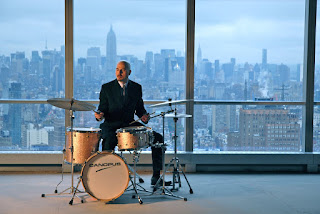Cymbals are the X factor of the kit for me. Drum sounds are more predictable, more attainable to me, because you can choose the woods, the bearing edge cut, the hoop and you cane TUNE them, choose various kinds of heads and combinations of heads. With cymbals, insofar as their intrinsic sound and feel, you can choose a certain alloy, a certain weight and profile, but still, you kind of get what you get.
Of course, there are many things that go into your cymbal sound; your touch, your stick, your intention, the part of the cymbal your play on, the dynamics and of course, YOU. However, cymbals have that mystical, otherworldly thing that goes beyond description and has remained a mystery to me for years.
Over the years I have gone thru so many phases: Old Ks that always had some kind of weirdness, Old As that sounded good, but still had a clumsy sounding bell, Sabian HH Sound Controls that had a beautiful oceanic sound but too much so, Paiste Traditionals that had this sort of clangy sound to the bell, Bosphorus Master Vintage that had a beautiful under stated woody sound, but void of musical overtones and Sabian Artisans that are a little too thick... why does it have to be so confusing?
And of course, it's one thing to find a cymbal that you love, but quite another to have a whole set that works together. (maybe that's another post in itself)
Of course, cymbals ain't cheap. So, if you're on a budget, as most musicians this day in age are, it's a constant quest of turning over cymbals, buying/selling, to find something that you really love. You have to be absolutely tenacious and unyielding in your quest, and also gotta have some luck!
So, last night I had a chance to visit a cymbal smith, Jesse Simpson, in Brooklyn last night. It was well worth the trip. As I stepped into his shop, I felt like I was transported to an alchemists lab. Finally, I was going to get some answers and some knowledge about cymbals that could help me evolve my conception of cymbals.
I also brought in a few of my Paiste traditional series cymbals that have always had some kind of "clangy" tones in them and Jesse evaluated them and explained to me why that is. I love those cymbals about 70% and the other 30% keeps me from really wanting to play them that much. So, Jesse is going to "modify" the cymbals with some additional hammering and lathing to bring out the qualities that I feel the cymbals are lacking. I'm very excited!
So, the quest continues, but I now feel I am closer to the answer than before. I will keep tenaciously searching, digging and feeding this obsession until, well, let's just leave it at that... until....






